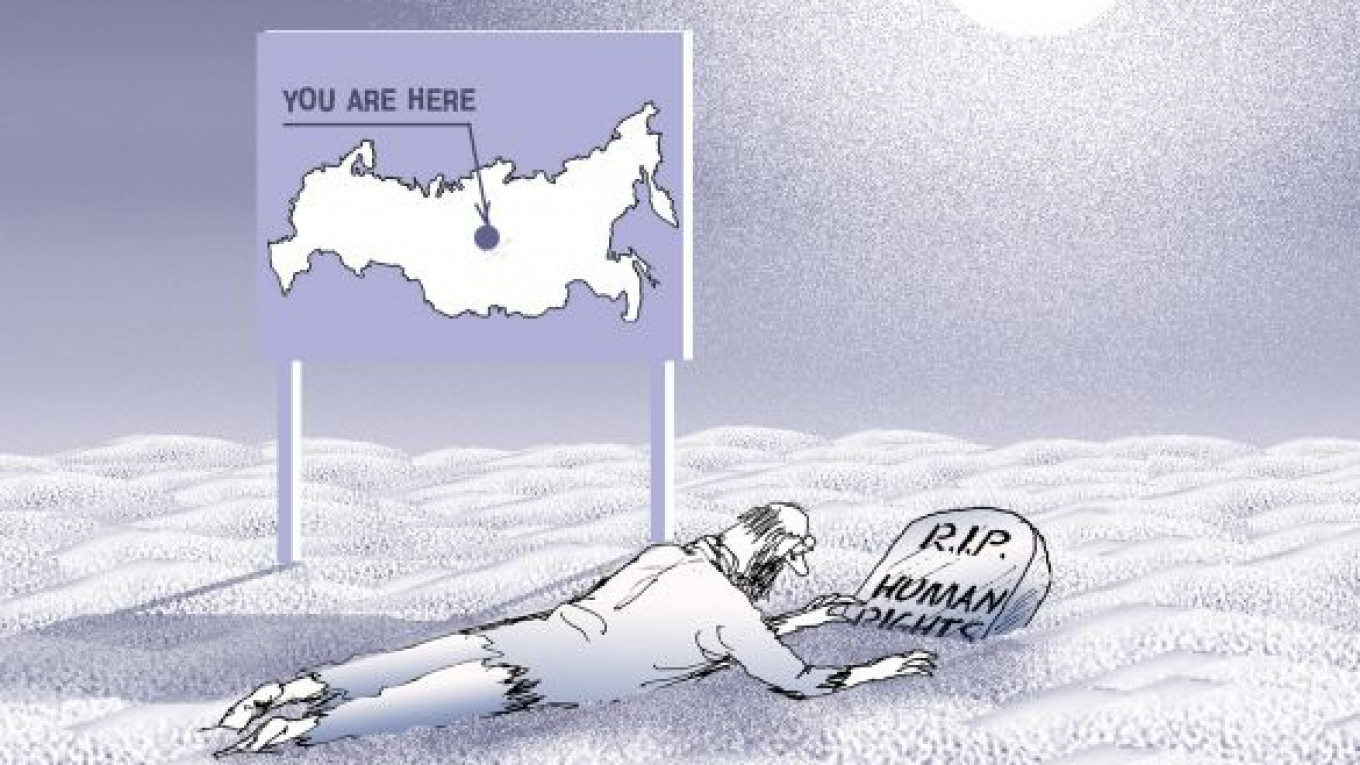Police raided the newly opened Museum of Power in St. Petersburg last week and confiscated four paintings by the artist Konstantin Altunin. One of the paintings depicted President Vladimir Putin and Prime Minister Dmitry Medvedev in women's undergarments. Another showed the St. Petersburg politician Vitaly Milonov, notorious for his homophobia, against the background of an LGBT rainbow.
Now the paintings are being analyzed to determine if they are "extremist." If they are, the artist could face two years in prison. Altunin decided not to wait for the authorities' conclusions and fled to France.
Altunin did not have much choice because he might face other charges as well. One of his paintings depicted Patriarch Kirill with a bare torso covered with gangster-like tattoos. This could easily be interpreted as violating another new law, "insulting the feelings of religious believers" — which carries a maximum sentence of one year in prison. The last painting depicts a young woman performing oral sex. The potential criminality is not in the painting itself, but in its name: "Erotic Dreams of the Deputy Mizulina." With a bit of a stretch, the investigators might deem that "insulting a public official," which carries a maximum sentence of one year of community service.
State Duma Deputy Mizulina initiated the homophobic law banning the dissemination of "propaganda of nontraditional sexual relations to children." Although the law is primarily aimed at the LGBT community, it is written so vaguely that it was also interpreted in society as a ban on information about oral sex. Television talk show host Ksenia Sobchak made a joke about it on Twitter: "What's that about? Does it mean we can't eat an ice-cream cone in public?"
That joke cost Sobchak dearly. A few days after her tweet, she was summoned to an interrogation by the Investigative Committee to determine if she had slandered a deputy. As Sobchak described the interrogation in an interview on state-controlled Rossia 24 television: "I'm embarrassed to comment on my talk with the investigator. It was strange to discuss oral sex with a young man for a half hour."
But she did share one detail of the interrogation on Twitter:
— The main question was "Why do you think that Mizulina is against oral sex?"
— I said, "So she's for it?"
— The investigator replied, "I don't know.'"
Despite the comedy, the case of insulting Mizulina has involved 10 people, including former Deputy Prime Minister Alfred Kokh and the LGBT activist and journalist Yelena Kostyuchenko. And as part of the investigation on Aug. 27, the police broke the door of the apartment of LGBT activist Nikolai Alexeyev and conducted a search.
Another LGBT activist, Alexei Davydov, described it on his Facebook page: "I just got back from Alexeyev's. It was more of a pogrom than a search. They pawed through bed sheets and clothes. They even went through the garbage can filled with food scraps (apparently they got hungry). They dumped everything right on the floor. And then those creeps left everything in a pigsty and walked out."
The case may sound like it comes out of a humorous essay by Mark Twain, but it's actually quite a serious matter. Proof of that is the case's lead investigator, Oleg Silchenko, who conducted the case against Hermitage Capital and Sergei Magnitsky and is a prime figure on the U.S. Magnitsky List.
Another serious matter is the slow-moving case against demonstrators who protested on Bolotnaya Square on May 6, 2012. Every month it grows in scope as more anti-Putin activists who were in one way another connected with the protest are arrested in their home towns.
The repression, which begun with Putin's return to the Kremlin, is beginning to look like the repression during the Soviet era. Opposition and civil activists, such as Ildar Dadin, are being forcibly placed in psychiatric hospitals. They are being charged with serious crimes that are fabricated; planting drugs has become especially popular. The number of political prisoners is growing. The Union of Solidarity with Political Prisoners counts 42 as of Aug. 2, and another 33 people are awaiting trial in politically motivated cases.
Perhaps a better indicator of the worsening of the human rights situation in Russia is the flood of Russian asylum seekers to Europe. Eurostat figures show that in 2013, Russia produced the largest number of people asking for political asylum. And the numbers are progressing geometrically. In the first quarter of 2013, 8,435 Russians sought asylum in Europe. That was almost twice the number who applied in the same period the previous year. Russia's problem is gradually becoming the continent's problem.
In the 1968 book "My Country and the World," Soviet human rights activist Andrei Sakharov makes the point that respect for human rights is an essential guarantee of global security. It is unfortunate that 45 years later, Sakharov is still only a voice crying in the wilderness.
Victor Davidoff is a Moscow-based writer and journalist who follows the Russian blogosphere in his biweekly column.
A Message from The Moscow Times:
Dear readers,
We are facing unprecedented challenges. Russia's Prosecutor General's Office has designated The Moscow Times as an "undesirable" organization, criminalizing our work and putting our staff at risk of prosecution. This follows our earlier unjust labeling as a "foreign agent."
These actions are direct attempts to silence independent journalism in Russia. The authorities claim our work "discredits the decisions of the Russian leadership." We see things differently: we strive to provide accurate, unbiased reporting on Russia.
We, the journalists of The Moscow Times, refuse to be silenced. But to continue our work, we need your help.
Your support, no matter how small, makes a world of difference. If you can, please support us monthly starting from just $2. It's quick to set up, and every contribution makes a significant impact.
By supporting The Moscow Times, you're defending open, independent journalism in the face of repression. Thank you for standing with us.
Remind me later.








